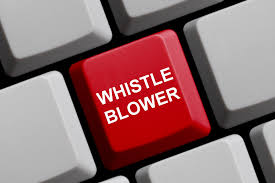


LEGAL DEVELOPMENTS | July 16, 2025
Legal Framework for protection of whistleblowers in India and its limitations
THis Article is Written by Bhumika Jain BBA LLB 2nd Year Bharati Vidyapeeth New Law College Pune
Introduction
A whistleblower is someone who reports fraud, abuse, corruption, or dangers to public health and safety to someone who is in the position to rectify the wrongdoing. The term was first used to refer to public servants, but now it covers the activity of any employee or officer of a public or private organization, also. Herein, we will be looking into the mechanism of the protection of whistleblowers in India through the Whistle Blowers Protection Act of 2014 and the Bill of 2015, in detail and the limitations of the same. Relative Articles of the Constitution of India, Right to Information Act and the Official Secrets Act, 1923 will also be assessed using various case laws.
Legal Framework
The Law Commission of India in 2001, had recommended that, in order to eliminate corruption, a law to protect whistleblowers was necessary. It had drafted a bill as well to address this issue.
In 2004, in response to a petition filed after the infamous murder of Satyendra Dubey, the NHAI Official who revealed corruption within NHAI; the Supreme Court of India directed the Central government that, ‘administrative machinery be put in place for acting on complaints from whistleblowers till a law is enacted.’ The government, in response, notified a resolution in 2004 named, ‘Public Interest Disclosure and Protection of Informers Resolution (PIDPIR)’. This resolution gave the Central Vigilance Commission (CVC) the power to act on complaints from whistleblowers.
In 2007, the Second Administrative Reforms Commission also recommended a specific law for whistleblowers. Alongside, The UN Convention against Corruption to which India is a signatory since 2005, encourages states to facilitate reporting of corruption and provides safeguards against victimization of the person making the complaint. In 2011 Whistleblowers Protection Bill was proposed which finally became a law in 2014.
In India, whistleblowers are protected under the Whistle Blowers Protection Act, 2014. It is an Act with 7 chapters and 31 sections, that establishes a mechanism to receive complaints regarding disclosure of any allegations of malpractices against public servant, its inquiry and relevant safeguards. The objective of the Act is to safeguard the complainant reporting corruption or wilful misuse of discretion. The Act extends to whole of India, but not applies to Special Protection Group constituted under the Special Protection Group Act, 1988. This law allows any person to make a public interest disclosure, defined under Section 4 of the Act; before a Competent Authority, but doesn’t allow anonymous complaints. The maximum time period for making a complaint is seven years.
The Competent Authority, defined under Section 3 of the Act, prepares a consolidated annual report of the performance of its activities and submits it to the Central or State Government that will be further laid before each House of Parliament or State Legislature, as the case may be.
Chapter III of the Act lists the powers and functions of Competent Authority on receipt of public interest disclosure. The Competent Authority shall verify the complainant and keep his identity, confidential. An inquiry shall be conducted to ensure further investigation. Any required documents shall be called upon, identity of complainant shall be revealed with written consent of whistleblower or otherwise, documentary proof shall be submitted by him. In case of lack of sufficient ground, the case can be closed by the Authority. In case of substantiated complaints; disciplinary action, compensation for loss to the government, criminal proceedings and corrective or any other necessary measures; shall be recommended.
Public authorities shall act on the recommendations in 3 months or submit reasons for any delay. The complainant shall be informed of the outcome and shall be given an opportunity of being heard.
Section 6 of the Act lists the matters not to be inquired by Competent Authority and Section 7 deals with the powers of competent authority.
Chapter V of the Act protects the person making disclosure against victimisation, witnesses, assistants to the case and the identity of complainants.
Further, Chapter VI deals with offences and penalties for furnishing misleading reports, revealing identity of complainants as well as punishment for false disclosure, to HOD in certain cases and also deals with offences by companies.
Section 20 states that; Any person aggrieved by any order of the Competent Authority relating to imposition of penalty under Section 14 or Section 15 or Section 16 may prefer an appeal to the High Court within a period of sixty days from the date of the order appealed against: Provided that the High Court may entertain the appeal after the expiry of the said period of sixty days, if it is satisfied that the appellant was prevented by sufficient cause from preferring the appeal in time. Further, Section 21 and 22 deals with Bar on Jurisdiction and Court to take cognizance, respectively.
Lastly, Chapter VII deals with Report on disclosures, protection of action taken in good faith, powers of Central and State Government to make rules, Rules to be laid before Parliament and State Legislatures, Power to remove difficulties and Repeal and Savings.
Analysis
On that note, let us now delve into the discrepancies in the Act. Firstly, there is no provision for anonymous complaints in the Act. This is against Articles 14 and 21 of the Indian Constitution. Many whistleblowers have lost their lives in the past due to the disclosure of their identity, which must be protected, henceforth.
In the 2017 case of K.S. Puttaswamy v. Union of India, the Supreme Court noted that the Right to Privacy is a component of the right to life and personal liberty, which are protected by Article 21 of the Indian Constitution. This right is subjected to certain restrictions, provided that a violation of someone’s right to privacy must commensurate with the desired outcome. With respect to this Act, complainant’s identity is revealed, which contradicts the Articles mentioned above.
Further, Article 14 of the Constitution, guarantees equality among equals and prevents discrimination. It implies that everyone in a similar situation will receive the same treatment in terms of the rights granted and the obligations placed upon them. On the other hand, if people in different situations are treated equally, prejudice may occur. Conclusively, the Act grants the competent authority discretionary authority over the revelation of the complainants’ identities, which the authorities may readily abuse. Therefore, it is crucial that an Impartial Committee investigates the matter.
With that, let us look into Right to information versus the Official Secrets Act, 1923.
Article 19 of the Constitution guarantees freedom of speech as well as freedom of press. This Article was later interpreted to include Right to Information, in the case State of U.P. v. Raj Narain. Further, The Evidence Act, 1872 prohibits the use of unpublished Government documents relating to State matters as evidence, provided the permission for the same has not been received.
The Official Secrets Act grants unrestricted power to keep information from citizens; imposes legal repercussion onto the person making the information, public; makes it extremely difficult for the accused under the Act, to get a bail. The Government violates this law against the opposing Journalists, very easily.
So, after long procedures, it was finally established that according to Section 22, of the Right to Information Act, 2005; the Right to Information Act, 2005 will take effect regardless of any conflicting provisions in the Official Secrets Act, 1923, any other currently enacted legislation, or any document that is enforceable under a law other than this Act.
The Whistleblowers Protection (Amendment) Bill, 2015; prohibits the reporting of a corruption related disclosure if it falls under any 10 categories of information. These categories include information related to: (i) economic, scientific interests and the security of India; (ii) Cabinet proceedings, (iii) intellectual property; (iv) that received in a fiduciary capacity, etc. It also disallows disclosures that are covered by the OSA. Otherwise, Any public interest disclosure received by a Competent Authority will be referred to a government authorised authority, whose decision shall be binding. But, this Bill has not been passed yet.
There are also discrepancies relating to the full operationalisation of the Act, its coverage in private sectors, amongst others.
Furthermore, Prevention of Corruption Act, 1988 (Amended in 2018) penalizes corrupt practices by public servants and indirectly supports whistleblowers by defining the offences they may report. Also, Section 177 of the Companies Act, 2013, mandates establishment of a vigil mechanism for directors/employees to report concerns, which are overseen by Audit Committees. SEBI (LODR) Regulations require listed companies to have whistleblower/vigil policies. SEBI also launched an informant mechanism under the SEBI (Prohibition of Insider Trading) Regulations, 2015. These laws, thus strengthens the Act in concern.
Conclusion
It is absolutely necessary to build India on the bases of transparency and accountability. The interests and the works of the whistleblowers are invaluable to eliminate the villains of the administrative aspects of the Indian society. The limitations of the Act must be dealt with to ensure the safety of the whistleblowers. They must be rewarded financially for the risks incurred. Thus, the relevant laws have been duly assessed to look into the legal framework of whistleblowers in India and the limitations of the same.
References
https://www.whistleblowers.org/what-is-a-whistleblower/
https://thc.nic.in/Central%20Governmental%20Acts/Whistle%20Blowers%20Protection%20Act,%202014..pdf
https://www.drishtiias.com/daily-news-analysis/whistleblowers-protection-act
https://prsindia.org/billtrack/the-whistle-blowers-protection-amendment-bill-2015



Comments (0)